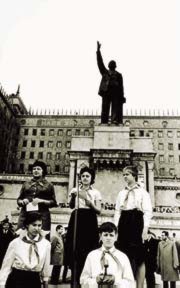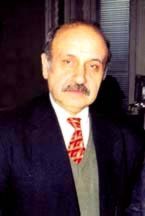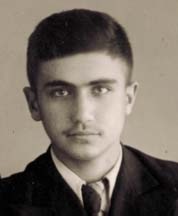|
Winter
1999 (7.4) Famous People:
Then and Now
Left: Ramiz Abutalibov, 1999 Right: Ramiz (right) at age 14, 1952 Ramiz Abutalibov is best known for his involvement in foreign policy. Since 1993, he has served as Ambassador-at-Large for Azerbaijan's Ministry of Foreign Affairs and as Secretary-General of the Azerbaijan's Commission for UNESCO. During the Soviet period, he was Head of the International Relations Department of the Central Committee of Communist Party of Azerbaijan, a member of Parliament and Head of the Foreign Affairs Commission for Azerbaijan's Supreme Soviet. Abutalibov has led Azerbaijan delegations to the World Congress on Human Rights, UNESCO General Conferences and the Conference on Stability in Europe. He has also served as Secretary-General of the Azerbaijan-France Friendship Society since 1997. _____ What experiences and interests in childhood would you say shaped your life and career? I grew up during World War II and was a product of the times. For example, the films that I saw during childhood played an important role in my life, especially in shaping my ideology. I used to watch these films over and over 10 to 15 times. There really wasn't much choice back then as only seven or eight films were being produced each year. Almost all of these films featured historical, military and war themes. My favorites were about Soviet spies penetrating the German Army and Sigmund Kolosovsky, a brave Polish general. At school I was interested in Humanities, perhaps, because I had such a kind history teacher. Our mathematics teacher was strict and I didn't like her; consequently, I never learned to like math. But I always tried to get excellent marks in history so that my teacher would like me. No one else in my family was interested in the Humanities. My father was an agronomist and my mother was a biology teacher. Actually, my parents didn't appreciate the fact that I was interested in history. They wanted me to become a doctor because they believed people needed doctors more than historians. My parents said that learning history was a waste of time since there was no truth in it. Life was so full of contradictions and lies when I was growing up. For example, my uncle was exiled to Siberia, and when I asked why, no one would tell me the truth. Later I discovered that he had mentioned the achievements of the famous Austrian geneticist Mendel during a lecture at the university and, subsequently, was exiled to Siberia for "propagating bourgeoisie sciences". I soon became sensitive about these contradictions. I would hear one thing in society but was conscious that it didn't match reality. At school we were told that Stalin was our great leader. But back home when my mother and grandmother talked about my uncle's exile, they never breathed Stalin's name and would only make a subtle gesture of twisting the ends of an imaginary moustache when they referred to him. Photo: Commemorating the 94th Anniversary of Lenin's birth (April 23, 1964). Youth in front of the Ministry Building in Baku. Lenin's statue was removed shortly after Azerbaijan gained its independence in 1991  How was your own childhood different from that of kids growing up today? When I was growing up, we lived by a double standard. We would say one thing in the street and absolutely the opposite at home. Today's youth are free of such dogmas and are fortunate to have the right to choose their own ideology and express their own opinions. The older generation will always grumble and complain that they were much better than today's youth. But I wouldn't say so. Times are changing and every era and period in history makes its own demands. We grew up during World War II and, of course, our interests were different from those of today's youth. We wanted to become diplomats, engineers, doctors and pilots. But today's kids want to become businessmen, lawyers and economists-the demands of the times have changed. I do believe, however, that both national and moral values were much stronger in our childhood than they are today. What advice would you give to young people as they enter the 21st century? I'm afraid history won't look kindly upon us this century-civil wars, political upheavals, massacres of innocent people and mass deportations. It's been a very difficult century. We've made considerable progress in science and technology, but we can't forget the terror that inventions like the atomic and nuclear bombs have brought upon humanity. The only consolation is that since the 1960s, my generation tried to change the image of the USSR, hoping to give socialism a human face. Perhaps future generations will say some warm words about us for our efforts. The former USSR was the only major country in the world that waged war on its own people-civil war, deportations and exile. I hope that future generations won't forget all these facts which are part of our history. They should never be repeated. Today's youth should criticize the older generation for these things. May they not repeat the mistakes that we made. In our youth we acted according to the interests of the government, not according to our own initiations and thoughts. But, of course, we tried, we did our best to create better conditions for future generations. I hope today's youth won't allow the government to force its ideology on them and make them join a single party like the Communist Party. Let them act independently, let them be real patriots and worthy of being called citizens of Azerbaijan. But acting independently doesn't mean creating chaos. Let them be careful not to create anarchy, let them be positive builders of society. Today's youth have their own right to choose; I hope they will make careful choices. Let them not regret their decisions later on. They are responsible for the future of Azerbaijan. What would you say is your greatest achievement in life? What do you want to be remembered for most? It wouldn't be culturally appropriate for me to say that I did this, I did that, and may people remember me for such and such. But beginning in the 1970s when I started going abroad, I began making investigations in foreign archives to discover what they contained about Azerbaijan. As a result I succeeded in wiping out some "white stains" from our historical records-items that had been rewritten by the Soviets and imposed as truth. For example, I was the first one in Baku to mention the names of Alimardan Topchubashi (President of Parliament and later Ambassador to France) and Jeyhun Hajibeyli (Chief Editor of Azerbaijan newspaper, the first official governmental newspaper in the Democratic Republic, 1918-1920). I wrote articles about them and brought original documents from France and deposited them in the Azerbaijan National Archives. There is such a notion as one's duty toward the past. I have fulfilled that duty as best I could. I would be very happy to be remembered for this. Our generation tried to do its best for future generations and, as of today, I feel proud to say that we have accomplished some things. I think it's fair to say that we laid down some of the first bricks on the path to independence.
Back to Index
AI 7.4 (Winter 1999) |


